
 | The Xenophile Historian |
THE HOLY BOOK OF UNIVERSAL TRUTHS,
K. U. P.
(Kimball's Unauthorized Perversion)
First, why do they try to communicate with us by making circles in fields of wheat, or by drawing lines in the Peruvian desert? It would make a lot more sense to put up a billboard with an announcement like, "Don't use nuclear power. It's more dangerous than you think."


Third, what's with all the anal probing reported by those who claim to have been abducted by aliens? I doubt if it is just for research; there is only so much information you can gather from the alien equivalent of a rectal thermometer. And the probes inspire too many bad jokes (see also what I wrote about sex with aliens below).

"Oh look, the Earthlings lost a giant yo-yo."
"That's not as good as what they did on their moon. They left behind some expensive equipment, including a car, and took home a bunch of rocks!"
And see my essay, "It Must Be The Mystery Factor," for my thoughts on the possibility that aliens visited us in the past.
For now, let's assume that alien life can be found on a planet in another star system. I've seen science fiction novels that speculated about creatures in deep space (e.g., Fred Hoyle's The Black Cloud), but they're so exotic I don't even want to begin exploring them in this essay. Looking for extraterrestrial life on planets will keep us busy enough.
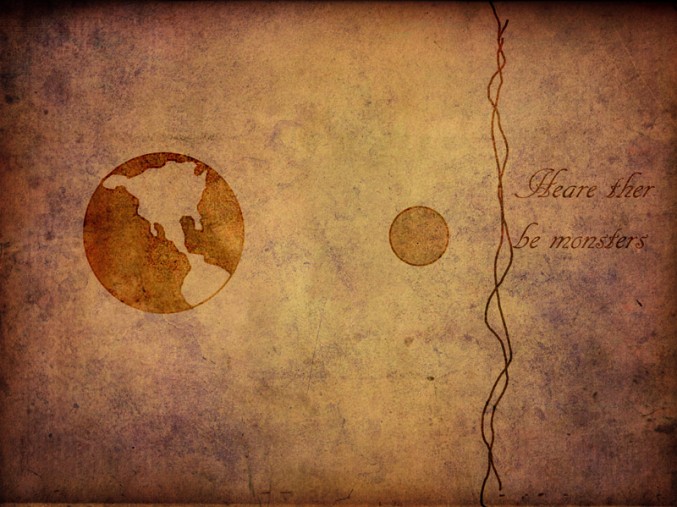
So what kind of planets are these? Alas, none of the ones we have found are earthlike, with an oxygen atmosphere, moderate gravity, moderate temperatures, etc. Most are what we call "hot Jupiters," planets larger than Jupiter that are close enough to orbit their stars in just days, not years. Granted, with our current technology we probably won't detect an earth-sized planet in another star system, but still we've seen enough to know that real life won't be like those science fiction TV shows that visited a new earthlike planet each week. In fact, so many factors go into making earth an ideal environment for human life, that the chances of finding another earth are infinitesimal. This page, The Incredible Design of the Earth and Our Solar System, lists more than sixty-eight factors that go into making our world a home for life, such as temperature, axial tilt, a nearly circular orbit, the Van Allen radiation belts, a large moon, chemical composition of the atmosphere and rocks, the type of galaxy, and so on. Change any one of those factors, and life on that planet is in a heap of trouble. Rich Deem, the author of that page, concludes that the odds against all those factors being set by chance are 1:1099, almost a googol (not Google!) to 1. Therefore, if life needs an earthlike planet for a home, it is safe to say that we are alone in the universe.
But what if life can exist under other conditions? There is no shortage of sci-fi literature about that possibility. In some cases, there is speculation about life based on other chemical compounds, which don't use the carbon atom, like the silicon horta on Star Trek. So far everyone agrees that non-carbon life won't resemble any plant or animal we are familiar with. Indeed, if such life exists, will we even recognize it as life? In the Star Trek episode, for instance, the trouble starts when human miners destroy a collection of silicon nodules, not realizing they are the horta's eggs.
In 2010 I read a news article which proposed that most life-bearing planets in the universe will be larger and hotter than the earth, with heavier gravity and denser atmospheres. If that is the case, earth will look cold and barren by comparison. Aliens from big, hot worlds might look at the earth the way we look at the Tibetan plateau, the South American Altiplano, or Antarctica.

Finally, sex with aliens is out! I know, Captain Kirk always seemed to get some, but if aliens are nothing like us, that's unrealistic, too. Remember the old pulp science fiction magazines with covers showing tentacled aliens preying on earth's fairest ladies (see below)? I think even when those magazines were on the newsstands, most people thought the idea was silly. First, the stories in the magazines usually had nothing to do with the covers. Second, you have to wonder why something resembling an octopus or lobster would be attracted to the same blondes and brunettes who appeal to the typical fifteen-year-old human male. Third, because the aliens obviously have different protein molecules, DNA and sex organs from us, it isn't clear what they intend to do with the women. Fourth, artists like Earle K. Bergey usually had the women wearing an impractical fashion--the infamous "brass brassiere" (Were the women supposed to heat up their bras before putting them on?). So forget about any "close encounter of the fourth kind."
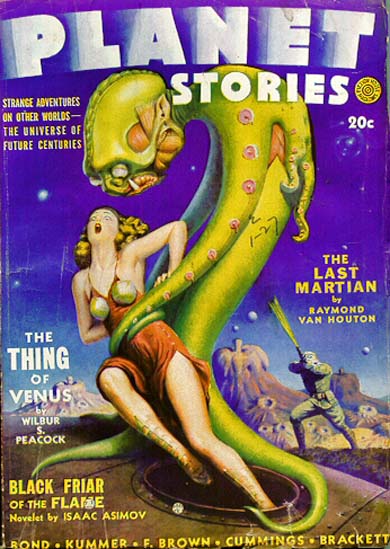
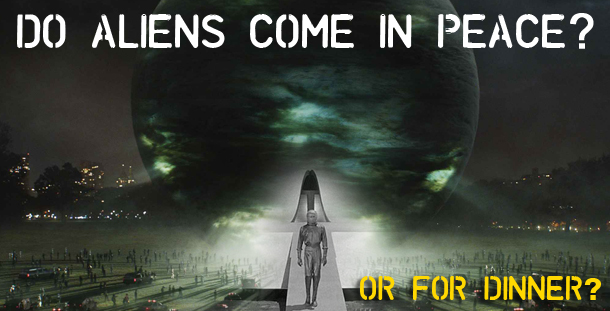
The classic unfriendly contact story is H. G. Wells' "The War of the Worlds." On the remote chance that you have not read the book, heard the 1938 radio broadcast, or seen any of the movies by that name, the story tells how Martians come to earth, build three-legged fighting machines armed with lasers and poison gas, and proceed to destroy every human army that gets in their way. They conquer big cities like London and New York, and it looks like all hope for humanity is lost, when suddenly they are killed by earth bacteria, against which Martian immune systems have no defense. That idea was enough to make us quarantine the Apollo astronauts when they returned from the moon, thinking that alien microbes could win the war if we did not follow careful decontamination procedures. A modern variant of the H. G. Wells story, "Independence Day," again gives the aliens an overwhelming military advantage, but their weakness is a computer virus.
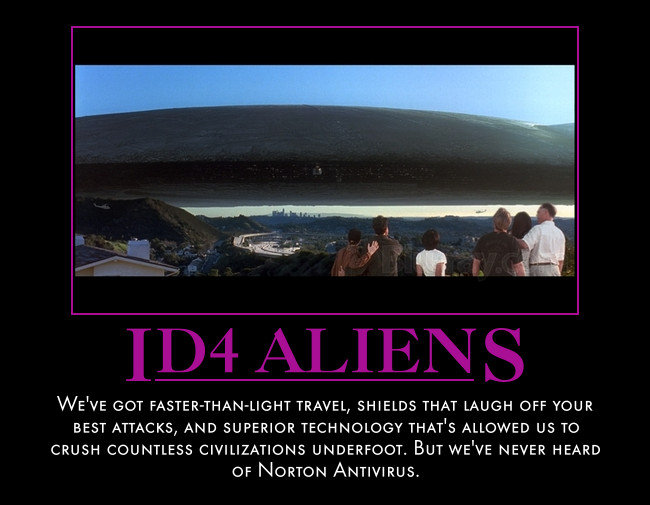
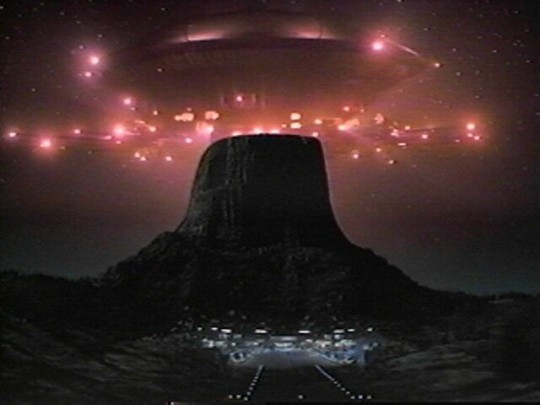
Well, if I wanted the future of humanity to be happy, I couldn't do better myself. Unfortunately, past history shows that most first contacts are bad news for the more primitive side. Like it or not, a meeting with aliens is more likely to resemble "The War of the Worlds" than "Close Encounters" or Star Trek. Here's why:
1. Culture shock is not much fun. It's going to happen to the side contacted by the other. From our own history, the best example is what happened when the Old World made contact with the New World. The Americas were less advanced technologically, and its inhabitants less genetically diverse. This meant that even the vast armies of the Aztec and Inca empires could be slapped down by a few hundred European soldiers; those natives who did not fall victim to Old World weapons were decimated by Old World diseases, which had been unintentionally brought across the oceans. And the natives who survived both the invasions and epidemics found themselves in a game where they did not know the rules, dealing with economic, political and social concepts that were totally foreign to them. Often they got the short end of the stick, even when the white man tried to help them (see this example). With the natives of Australia and the islands of the Pacific, it was the same story; some tribes (i.e., the Tasmanians) were completely wiped out, while those communities that survived are mere shadows of what they used to be. It could have happened in Africa, too, but fortunately for the Africans, they had a larger population to start with, enough to weather the losses inflicted by European soldiers and slavers; what's more, Africa struck back with worse diseases and parasites than those the Europeans brought.
The only case I can think of where the primitive society came out ahead is nineteenth-century Japan. In the forty years after the United States opened up Japan for trade, the Japanese heroically modernized their country, to the point that at the end of the Meiji period, they took on and defeated two much larger neighbors, China and Russia. Well, keep in mind that the Japanese had the advantage of foreknowledge. Before Commodore Perry arrived, the Japanese knew that more advanced nations existed; they had started trading with the Chinese in the third century A.D., and Europeans in the sixteenth century. Then they kicked all foreigners out of their country when they decided it was no longer safe to have them around. But even during the two hundred years when Japan was officially closed, some Dutch books still managed to get in, allowing a few Japanese to follow what was happening overseas. If space aliens exist, earth is more closed to them than Japan was ever closed to the West. With extra-terrestrial beings we do not have the luxury of knowing who they are, why they are here, or what strengths and weaknesses they have--unless you believe the "Men In Black" movies are true stories. In short, if aliens show up on earth at a future date, we won't have a clue what to do.
2. The aliens we meet will probably be ruthless warriors. More like the Klingons than the Vulcans, if you don't mind me using Star Trek analogies again. Here on earth, some nations and cultures have been described as gentle, like modern-day Brazil or Madagascar, but you never hear about any time in history when they ruled the world. Likewise, any civilization that can travel between the stars must have gotten the resources to do that by defeating (read: slaughtering) all competitors on their homeworld. Science fiction stories with a military flavor, like Robert Heinlein's Starship Troopers and the movie "Battle: Los Angeles," often had the theme that that man is the toughest, most ornery species in the entire universe, and even if we are behind technologically, we are going to kick alien butt until we win. In real life, however, that will only be true if we go to alien homeworlds before they visit ours. While we like to talk about the meek inheriting the earth, and the lion lying down with the lamb, those are events scheduled for a future age, after the coming of the Messiah.

I digressed about space merchants and interstellar travel because it has one more implication for us, an ominous one. Any intelligent beings that visit us cannot go home again. If they try to go back, the world they return to won't be the same as the world they left. Consider the example of a spaceship that can travel ten percent of the speed of light, going from here to Alpha Centauri, a distance of 4.3 light-years. That trip would take forty-three years each way, and allowing for one year to explore the Alpha Centauri system, that makes for a round trip of at least eighty-seven years. If you were on that mission, you probably wouldn't live long enough to see both the beginning and the end of it--the ship would have to travel at more than 80 percent of the speed of light before relativity's famous time dilation effect makes much of a difference. And just think of all the things that have happened here on earth in the past eighty-seven years. When Sir Francis Drake sailed around the world, the voyage took him five years, and upon returning to England, the first thing he did was ask if Queen Elizabeth I was alive and well. How much more will earth change while the Alpha Centauri spaceship is away!
If a spaceship cannot go back to its homeworld, it cannot receive supplies or assistance from its homeworld, either. Therefore we can assume that visiting aliens will try to take whatever they need from us. Their attitude will be a lot like Hernando Cortez when he had his ships burned, to keep his men from trying to leave Mexico; they will have a grim determination to succeed in whatever they are doing, or die trying. They might live like rapacious nomads, traveling to a world, stripping it of whatever resources they want or need, and then moving on to the next world. Dr. Stephen Hawking, the famous astrophysicist, suggested as much in a 2010 interview: "We only have to look at ourselves to see how intelligent life might develop into something we wouldn't want to meet. I imagine they might exist in massive ships, having used up all the resources from their home planet. Such advanced aliens would perhaps become nomads, looking to conquer and colonise whatever planets they can reach."
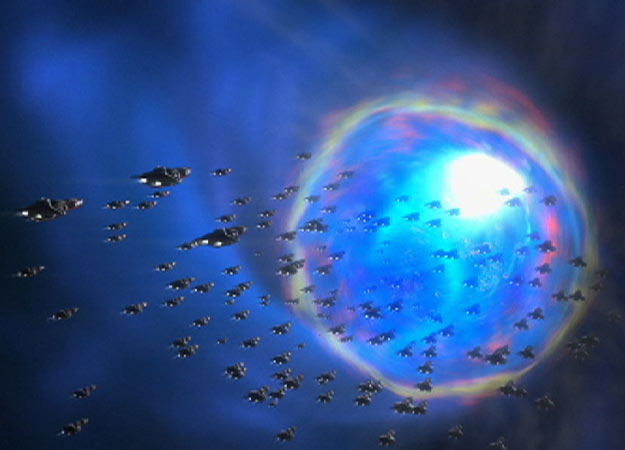
4. Even if everything else I said in this essay is wrong, and the aliens turn out to be friendly, we could still mess up. It has been said that you only get one chance to make a good first impression. When meeting another person for a first time, at least you have an idea about what motivates that person, and how he might respond to your actions. How will we know what motivates an alien? It will be dreadfully easy to make a mistake, just because of misunderstandings.
For an example of such a misunderstanding, I will remind readers of a sci-fi classic, The Day The Earth Stood Still. There a humanoid alien named Klaatu came to warn earth that his people will not allow humans to have nuclear weapons. However, this does not remain a diplomatic mission for long; trigger-happy humans shoot Klaatu when they think he is armed. Then he becomes a fugitive after escaping from the hospital where he recuperated, and later he is shot again, this time fatally. Fortunately Klaatu is brought back to life by the medical equipment on his ship, but the whole experience confirmed the worst suspicions of his civilization, that humans can't be trusted when armed.
If the reader would prefer an example from history over an example from science fiction, history has plenty of them, too. I will point to just one, the first meeting between the Romans and Parthians, in 92 B.C. The Parthians had an empire nearly as powerful as the Roman state, but all the other kingdoms the Romans had encountered in Asia were minor states populated by Greek-speaking Asians, so they treated the Parthian ambassador with contempt, thinking he was there to become another Roman vassal. What a mistake that was! Because of it, the Parthians and their Persian successors became archenemies of the Romans, starting an east-west conflict that lasted for seven hundred years, until the Arabs came along and overran both sides.
5. Conclusion: If there is life out there, if will take an awfully long time to find it, or for it to find us, simply because the universe is so big. I also hope we don't encounter it anytime soon, at least until the human race has matured some more. Of course they could be avoiding us for the same reason. Remember what I said at the beginning of this section about Star Trek Vulcans listening to our radio and TV programs for decades before we met them in person. It has been more than a century since the invention of radio, and more than sixty years since the first television broadcasts. And all that time we have been firing those signals out in space at no one in particular. Thus, our TV signals have reached every star within sixty light-years; it is theoretically possible for aliens near any of those stars to watch "I Love Lucy," if their receiving equipment is sensitive enough. Our radio signals have gone even farther by this time, potentially reaching anyone in a 100-light-year range.
Of course, it will be one thing to pick up those signals, and another thing to understand what they mean. The first task in translating would be to prove they are not random noise, like the radio signals generated by the planet Jupiter. If aliens can make that step and decipher the entertainment and information we send to ourselves, can anybody blame them for not wanting to show themselves to us? Think about it, the next time you get a good look at the night sky. Pleasant dreams.
Support this site!